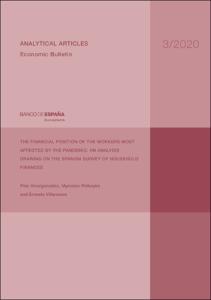Registro completo de metadatos
| Campo DC | Valor |
|---|---|
| dc.contributor.author | Alvargonzález, Piluca |
| dc.contributor.author | Pidkuyko, Myroslav |
| dc.contributor.author | Villanueva, Ernesto |
| dc.coverage.spatial | España |
| dc.date.accessioned | 2020-07-22T13:19:02Z |
| dc.date.available | 2020-07-22T13:19:02Z |
| dc.date.issued | 2020-07-22 |
| dc.identifier.uri | https://repositorio.bde.es/handle/123456789/13244 |
| dc.description | Artículo de revista |
| dc.description.abstract | In the European economies, employment in the retail sector, in accommodation and food services and in the arts and recreation activities has been hit especially hard by the pandemic, so it is important to ascertain the financial resources that the individuals working in these sectors have available to withstand a possible fall in their income. This article draws on the Banco de España’s Survey of Household Finances (EFF, by its Spanish abbreviation) to characterise the financial position of the workers most affected by the present crisis. In 2017, these sectors employed approximately half of all women and the under-35s, two population groups with relatively lower labour income levels. In many cases, these workers lived in households that included higher income earners, which may partially mitigate the incidence of possible job losses. Even so, in 2017, 28% of those employed in the sectors affected lived in households whose financial assets amounted to less than one month’s income, and one in 12 lived in households for which debt repayments amounted to more than 40% of their pre-tax income. Among the workers in the sectors most affected by the pandemic, the financial position of those who were less able to work from home and those employed in the accommodation and food services and arts and recreation sectors was relatively more vulnerable. |
| dc.format.extent | 13 p. |
| dc.language.iso | en |
| dc.publisher | Banco de España |
| dc.relation.ispartof | Economic Bulletin / Banco de España, 3/2020 |
| dc.relation.hasversion | Versión en español 123456789/13243 |
| dc.rights | Reconocimiento-NoComercial-CompartirIgual 4.0 Internacional (CC BY-NC-SA 4.0) |
| dc.rights | In Copyright - Non Commercial Use Permitted |
| dc.rights.uri | https://creativecommons.org/licenses/by-nc-sa/4.0/deed.es_ES |
| dc.rights.uri | http://rightsstatements.org/vocab/InC-NC/1.0/ |
| dc.subject | COVID-19 |
| dc.subject | Inequality |
| dc.subject | Individual and household income |
| dc.subject | Teleworking |
| dc.subject | Household finance |
| dc.subject | Structural analysis |
| dc.subject | Financial analysis |
| dc.title | The financial position of the workers most affected by the pandemic: an analysis drawing on the Spanish Survey of Household Finances |
| dc.type | Artículo |
| dc.identifier.bdebib | 000469185 |
| dc.identifier.bdepub | ECBU-2020-3B-art23 |
| dc.publisher.place | Madrid |
| dc.subject.bde | Economía del consumo y del ahorro |
| dc.subject.bde | Distribución de las rentas y riquezas de las personas |
| dc.subject.bde | Mercado de trabajo |
| dc.publisher.bde | Madrid : Banco de España, 2020-07-22 |
| dc.subject.jel | E21 |
| dc.subject.jel | G51 |
| dc.subject.jel | J21 |












